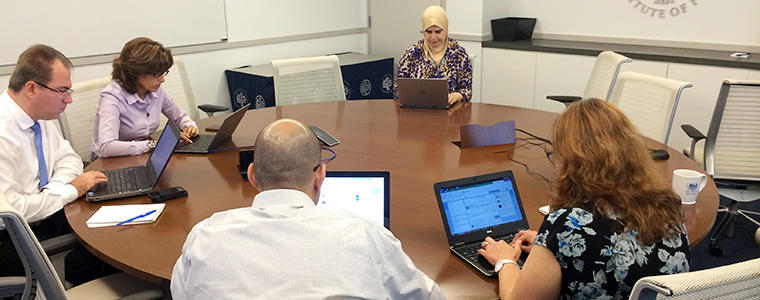Will Iraq’s current Prime Minister Nouri al-Maliki defy efforts to replace him? Will it break apart into several separate states? Should its neighbors do more to challenge the militants rampaging across the border with Syria? And are we giving this group legitimacy by acceeding every time their leaders change the organization's name -- "Islamic State" or their earlier moniker, "The Islamic State of Iraq and Syria"?

Experts from the Iraq program at the U.S. Institute of Peace tackled these and other questions in a chat on Twitter on August 12. Manal Omar, Elie Abouaoun, Sarhang Hamasaeed, Raya Barazanji, and Khitam Al-Khayhanee connected with people around the world using the hashtag #USIPIraq.
Government in Transition
NPR’s Deborah Amos asked whether it is important that both the United States and Iran pressure al-Maliki to step down, saying that “Maliki still seems up for a fight.” Manal Omar responded that his peaceful transition is so important that the U.S. should leverage any relations it has to encourage him to step down without violence.
@USIP @deborahamos it is crucial - any relations we have w/ #Maliki in #Iraq shld be used - a graceful transition is important 4 every1one
— Manal Omar (@ManalOmar) August 12, 2014
A Fractured Iraq?
Emily Bennington posed a question on the minds of leaders around the world:
In your honest opinion, do you believe Iraq will break into separate states, e.g. Kurds in the north, etc. #USIPIraq
— Emily Bennington (@EmilyBennington) August 12, 2014
USIP’s Raya Barazanji and Manal Omar both replied that Iraq’s constitution may help keep the country together.
@EmilyBennington #USIPIraq not necessarily, there is a provision in the constitution for autonomy & decentralized govt.
— Raya Barazanji (@rbarazanji) August 12, 2014
@EmilyBennington I don't believe so - not now - there is a way 2provide regional autonomy w/in the constitution w/out dividing #USIPIRaq
— Manal Omar (@ManalOmar) August 12, 2014
Joel Wing, author of the Musings on Iraq blog, also chimed in:
@Jwhittaker02 @ManalOmar @USIP a new PM opens possibilities for a better center-regional relationship #USIPIraq
— Joel Wing (@JoelWing2) August 12, 2014
Find the full conversation here.
Regional Response
Lara Jakes, a writer for the Associated Press, asked why Iraq’s neighbors have not responded more directly to counter the Islamic State.
@ManalOmar @deborahamos @USIP Y haven't regional players (KSA, Turks, Ku, Jords) stepped up to fight ISIS - threat to them too? #USIPIraq
— Lara Jakes (@larajakesAP) August 12, 2014
Responses to her question varied, with USIP’s Elie Abouaoun replying that some powers are trying to use the Islamic State to further their own agendas and NPR’s Amos noting that many are hedging to see what happens after Maliki’s departure.
IS vs. ISIS?
The militant group calling itself the Islamic State has expressed its intention to create a new caliphate stretching across the Middle East, beginning in Syria and Iraq. USIP staffer Nathaniel Wilson wondered whether referring to the group by their preferred name confers a sort of undue legitimacy, sparking a long exchange that began with Sarhang Hamasaeed’s response.
I would call it the Islamic State, don't think it adds legitimacy to them. Denial will not help. @9nwilson @USIP #USIPIraq
— Sarhang Hamasaeed (@sarhangsalar) August 12, 2014
Other interesting questions included:
- What actors, aside from the Iraqi government, might be able to mitigate the crisis?
- What groups are working in Iraq now to unwind radical ideologies?
- What changes will the newly-nominated prime minister, Haider al-Abadi, face in forming the new government?
- Can al-Abadi be the inclusive figure that Iraq needs to stay together?
- Does American aid in Kurdistan signal an inevitable Kurdish separation?
To see all of the conversations, check out the entire #USIPIraq archive.



